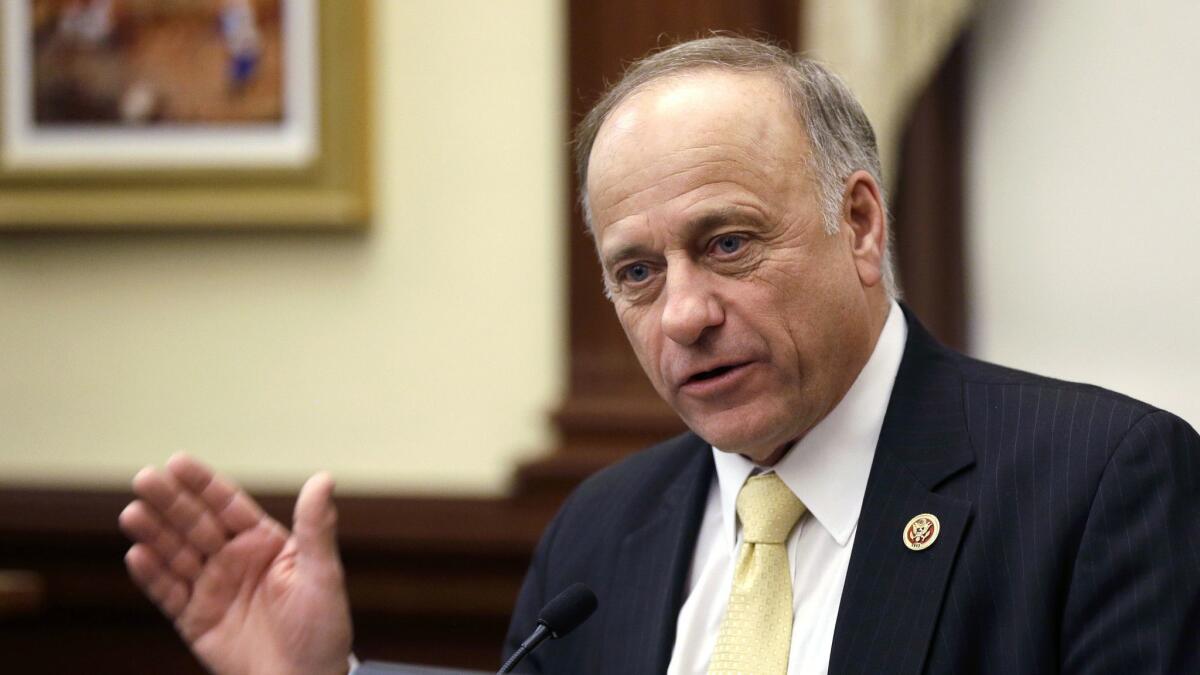House votes overwhelmingly to condemn white nationalism amid furor over Rep. Steve King’s remarks

- Share via
Reporting from Washington — The House voted overwhelmingly on Tuesday to condemn white nationalism and white supremacy, a measure prompted by the comments of Rep. Steve King (R-Iowa), who openly questioned why those terms had become offensive.
Having been stripped of his committee assignments Monday and facing further reproach, King went to the House floor Tuesday to say that he would support the resolution while continuing to protest that he had been misquoted in the New York Times article.
“There is no tape for this interview I did. There’s no way to go back and listen,” he said, conceding that he might have said the quoted words but challenging how they have been interpreted. “That ideology never showed up in my head. I don’t know how it would have come out of my mouth.”
The resolution, introduced by House Majority Whip James E. Clyburn (D-S.C.), mentions King’s remarks in its preamble, but the measure does not directly rebuke King himself. It passed 424-1, with Rep. Bobby L. Rush (D-Ill.) voting no because he favors a censure of King.
Clyburn, the highest-ranking African American congressional leader, called white nationalism and white supremacy “clear and present dangers to our great Republic” in floor remarks Tuesday.
“When elected representatives give cover and comfort to those who spread racial divisiveness, we embolden those on the fringes on our society, and we have seen some of the results,” he said, citing the hate-motivated murders of black churchgoers in Charleston, S.C., and synagogue attendees in Pittsburgh.
King sat apart from his colleagues on the Republican side of the aisle as Clyburn spoke. Moments later, King rose, made the sign of the cross and descended into the well of the House to give his remarks.
King noted he came from a family of abolitionists, before ultimately calling on his colleagues to support a measure that is intended to serve as a serious admonition against him.
“All men and all women are created equal,” he said. “It is in my heart, it is in my soul, and it is in my works.”
But those words came too late for his own Republican colleagues, not to mention scores of Democrats who are ready to pursue more serious actions against King, including censure -- the most serious House sanction short of expulsion.
Rep. Liz Cheney of Wyoming, the third-ranking House Republican, called Tuesday for King to “find another line of work,” a day after GOP leaders moved to punish King by stripping him of his committee assignments and King earned a rebuke from Senate Majority Leader Mitch McConnell (R-Ky.).
House Minority Leader Kevin McCarthy (R-Bakersfield) condemned King’s comments but stopped short of calling for his resignation. “I think that’s up to Steve King,” he said.
Two Democrats have filed censure resolutions that are set to see floor action by Wednesday.
Speaking to reporters Tuesday, House Majority Leader Steny Hoyer (D-Md.) praised Republican leaders for their action but left open the possibility that he would vote for a censure resolution.
“We haven’t definitively decided what the next step ought to be,” Hoyer said.
Hoyer exploded when asked how King’s behavior compared to that of the last House member to be censured, Rep. Charles Rangel (D-N.Y.).
King’s conduct, he said, “far exceeds” Rangel’s actions, which included improperly using his office to solicit funds and failing to pay taxes on a vacation home. Hoyer served as majority leader during Rangel’s 2010 ethics proceedings and pushed to reprimand Rangel, a lesser punishment than censure.
“What King is doing and what others have done is to encourage the undermining of the basic principles of our country,” he said. “In my opinion, that is a more dangerous phenomenon than anything Charlie Rangel did.”
The controversy over King was ignited when he said in a New York Times interview published last week, “White nationalist, white supremacist, Western civilization — how did that language become offensive?”
It followed a long string of remarks over the years disparaging immigrants and minorities, as well as a seeming embrace of far-right foreign politicians and parties that have been openly hostile to those groups.
Asked why the GOP conference had not taken action against King before, McCarthy said that he is “a brand new leader” and that he had recently researched King’s past comments.
“There is no room for white supremacy,” McCarthy said. “We don’t take this lightly.”
Last year, through the campaign and King’s election to a ninth term, House Republican leaders remained silent about King’s views. In recent weeks, Republicans have seen a potential alternative to King after Iowa state Sen. Randy Feenstra announced that he will challenge the congressman in the 2020 Republican primary.
King served on the House Judiciary, Agriculture and Small Business committees in the last Congress.
Reacting to the loss of King’s committee posts, Feenstra said Monday that voters had “lost their seat at the table because of Congressman King’s caustic behavior.”
In a statement Monday, King said: “Leader McCarthy’s decision to remove me from committees is a political decision that ignores the truth.... Ultimately, I told him, ‘You have to do what you have to do, and I will do what I have to do.’ ”
At a closed-door Democratic caucus meeting Tuesday, Clyburn presented his resolution condemning white nationalism. According to multiple attendees, Clyburn said it was written to win near-unanimous support among Democrats and Republicans.
Clyburn did not express support for more serious censure resolutions being drafted by other Democrats, attendees said, but neither did he discourage them. He said votes on the other motions, being offered by Reps. Tim Ryan of Ohio and Rush will take place Wednesday.
“He didn’t discourage Rush or Ryan from what they’re doing,” said Rep. G.K. Butterfield (D-N.C.).
Rep. Emanuel Cleaver II (D-Mo.) said passage of Clyburn’s resolution “is going to clearly make an expression that we are not tolerating that kind of thing anymore from House members.”
“I hope this becomes a signal to the American public that we will not tolerate bigoted statements and verbally muddy statements from people on our side,” he added.
Several Democrats, including Rush, argued that the House should go further than Clyburn’s resolution.
“Anything short of censure is shallow,” Rush said. “Steve King has made a career of making racist statements. That is the only thing he is known for and this pattern of rabid racism must be confronted head-on by the House of Representatives.”
Rep. Gregory Meeks (D-N.Y.) said he thinks the Clyburn resolution “is just the beginning.”
“I don’t think there is any place for him or those comments in the United States Congress.... We’ve got to get rid of the climate and to show all the citizens of the United States that that’s not who we are as a country.”
Meeks said the onus is on Republicans to oust King.
“They should do it,” he said. “They should be the ones to say, ‘We can’t tolerate this within our party, that this will eat us up like a cancer.’ ”
Rep. Alexandria Ocasio-Cortez (D-N.Y.) said lawmakers should consider referring King to the House Ethics Committee for potential expulsion.
“I think censure is a minimum of what we should be doing, and we should at the very least be in agreement with both caucuses on that,” she said. “Folks in my district don’t think that any sitting member of Congress should be embracing white supremacy.”
John Wagner and Mike DeBonis write for the Washington Post.
More to Read
Get the L.A. Times Politics newsletter
Deeply reported insights into legislation, politics and policy from Sacramento, Washington and beyond. In your inbox three times per week.
You may occasionally receive promotional content from the Los Angeles Times.










